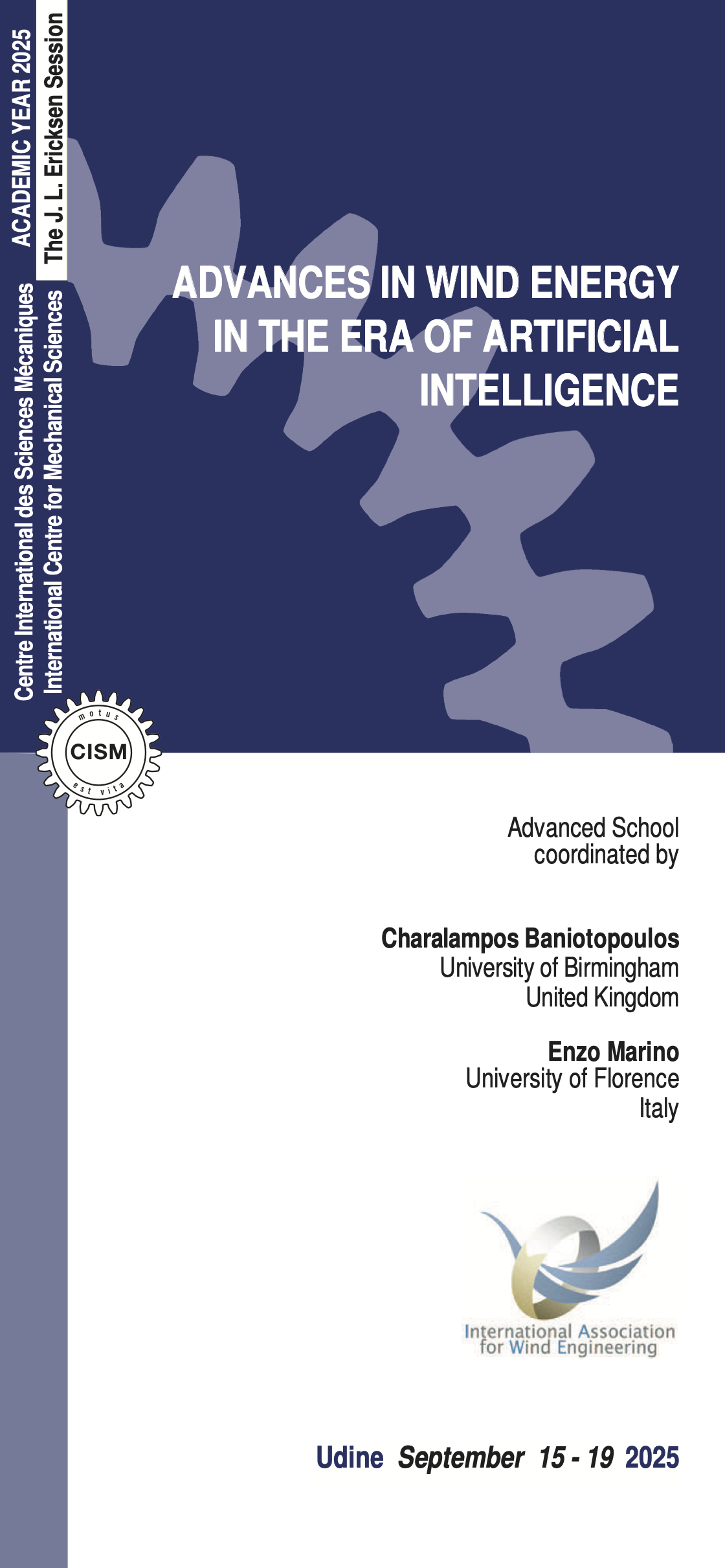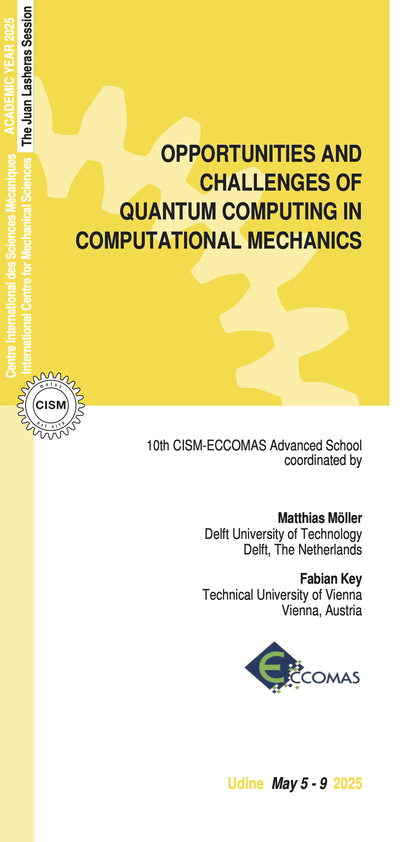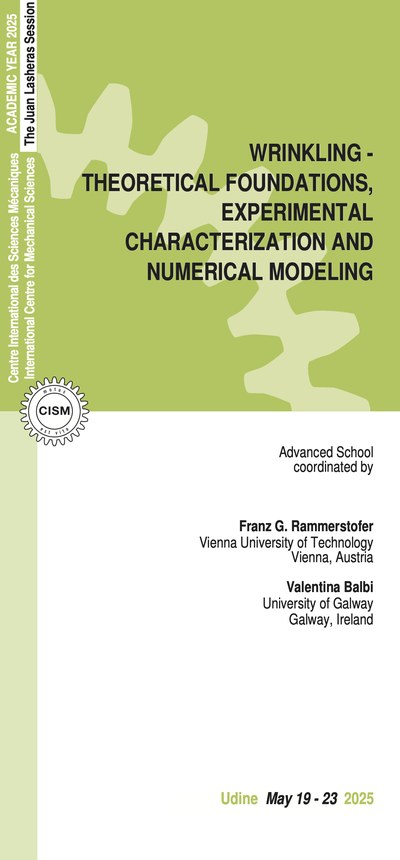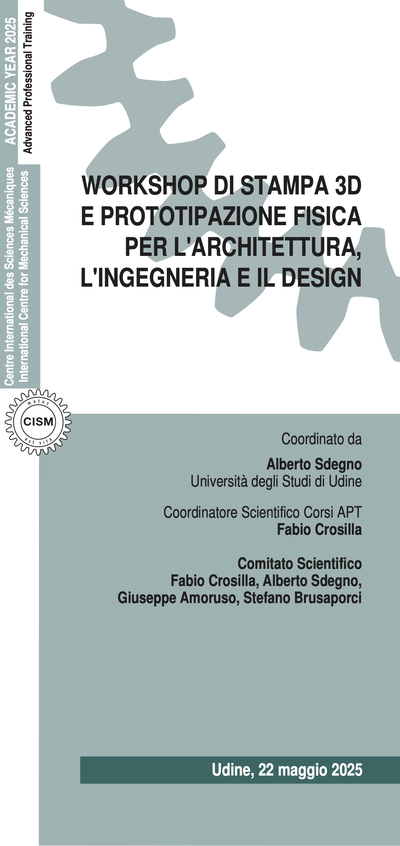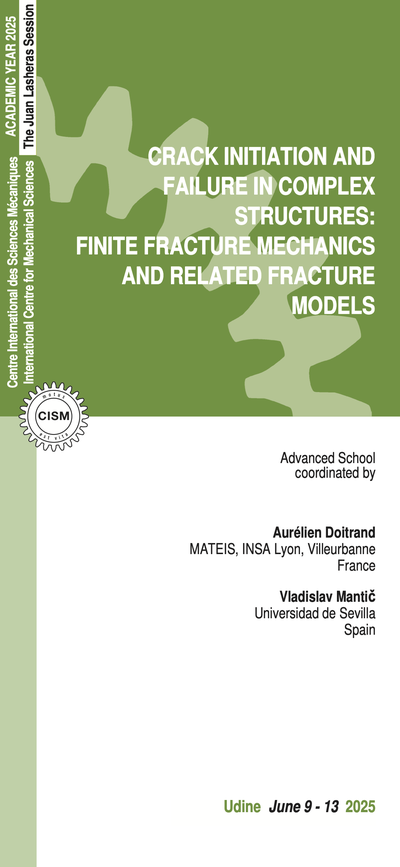As climate change is nowadays one of the greatest global threats and challenges, the recent global initiatives reflect the strong will of societies to synergistically and proactively apply robust strategies to moderate the climate crisis. This overarching set of policies aims at making Europe climate neutral in 2050, i.e. with zero emissions of greenhouse gases by that date. This strategy includes, for instance, the plan for a 25-times increase in Offshore Wind by 2050, a fact that requires paramount cutting-edge innovation in Wind Energy. Within this framework, AI in all its forms including Aeolian potential big data management, Digital Twins, Machine Learning and Artificial Neural Network approaches are destined to play a major role in the coming years in boosting Wind Energy.
The present CISM Course aims to systematically cover all current trends related to the use of AI to advance Wind Energy. During the course, besides the fundamental knowledge regarding wind and wind energy yielding, including offshore installations, new technologies such as LiDAR for the prognosis of the Aeolian potential, will be presented, along with Machine Learning and Digital Twins techniques applied to the design of wind energy systems. Along these lines, current achievements related to the accuracy of the assessment of the wind resources and the respective wind flow characteristics will be presented. The advances in the design and optimized maintenance of wind energy converters by means of Machine Learning techniques will be presented. It seems that nowadays the key and the game-changer is the in-time prognosis of the response and performance of the wind energy systems, based on high performance monitoring and inspection data. To this end, the concept of Digital Twins has begun to be employed, aiming to bridge the gap between the numerical model and the physical asset by integrating the measurement that, however, can hardly be realised via traditional tools. The emerging artificial intelligence offers a feasible solution from a novel perspective: Digital Twin prototypes are applied to optimise and control the performance of the wind energy systems by integrating inspection and measurement data via Bayesian inference and Machine Learning. Indeed Digital Twins have a promising potential to provide innovative insights into Wind Energy infrastructure status with the physical model, monitoring data and inspection results integrated.
The course will also cover the trends of promising new technologies and valuable topics such as the concept of modular sustainable energy islands and the sustainability analysis of selected types of Wind Energy converters. With these lectures we aim to attract doctoral students, post-doctoral researchers, and practicing engineers working with data-driven Wind Energy projects. The objective is to provide the audience with all the tools necessary to better understand the most recent developments on the above described subjects, and thus to facilitate the technology transfer from research to applications.
Baniotopoulos, C., Borri C. & Stathopoulos, T. 2012, Environmental Wind Engineering and Design of Wind Energy Structures, CISM Lecture Notes, Springer Wien, New York, p. 358.
Dai, K. et al. 2023, A tuned cable-inerter system for vibration reduction of towers, International Journal of Mechanical Sciences 248, 108199.
Bogoevska, S. et al (2017). A data-driven diagnostic framework for wind turbine structures: a holistic approach. Sensors, 17(4), 1–28.
Ferri, G., & Marino, E. 2023, Site-specific optimizations of a 10 MW floating offshore wind turbine for the Mediterranean Sea. Renewable Energy, 202, 921-941.
Ferri, G., Marino, E., Bruschi, N., & Borri, C. (2022). Platform and mooring system optimization of a 10 MW semisubmersible offshore wind turbine. Renewable Energy, 182, 1152–1170.
Naser, M.Z. ed., 2022. Leveraging Artificial Intelligence in Engineering, Management, and Safety of Infrastructure. CRC Press.
Wu, T. and Snaiki, R., 2022. Applications of Machine Learning to Wind Engineering. Frontiers in Built Environment, 8, p.811460.
Zao, Z., Dai, K., Lalonde, E., Meng, J., Li, B., Ding, Z. and Bitsuamlak, G. 2019, Studies on application of scissor-jack brased viscous dumping turbines under seismic abd wind loads, Engineering Structures 196,109294.
5 lectures on:
Induction of AE in Wind Energy; Trends and concepts; Digital Twins; Sustainability Analysis.
4 lectures on:
Advances in Wind Energy Structures: current trends on the use of AI to advance Wind Energy infrastructure.
4 lectures on:
Intelligent Structural Control for wind energy structures; Smart design of hybrid super-tall wind turbine towers; AI-assisted Risk Assessment of wind farms under hazard scenarios.
5 lectures on:
Use of AI in Computational Fluid Dynamics; CFD for renewable energy applications and Digital Twins; AI for renewable energy assessment.
5 lectures on:
AI-based Structural Health Monitoring; System Identification, Physical Wind Load and Response Modeling for Digital Twins Adaption; AI and Structural Health Monitoring-based Maintenance Decisions.
5 lectures on:
Dynamics of offshore structures: fundamentals and data-driven methods for the dynamic analysis of offshore wind energy systems.
5 lectures on:
AI-based windstorm modelling under changing climate; AI-based wind nowcasting / forecasting; AI-based aerodynamics and aeroelasticity modelling; AI-based structural semi-active/active control; AI-based post-windstorm recovery.
ADMISSION AND ACCOMMODATION
The course is offered in a hybrid format, allowing participants the flexibility to attend either in person or remotely via the Microsoft Teams platform.
Admission to on-site attendance is granted on a first-come, first-served basis to comply with the capacity of the lecture room.
Application forms should be submitted online through the website: http://www.cism.it. A confirmation message will be sent to participants whose applications are accepted.
Registration fees:
- Early Bird On-Site Participation: € 650.00 + VAT* - Deadline: July 15, 2025
- Late On-Site Participation: € 800.00 + VAT* - Deadline: September 2, 2025
- Live Streaming Online Participation: € 250.00 + VAT* - Deadline: September 2, 2025
On-site participation includes a complimentary bag, five fixed menu buffet lunches, hot beverages, downloadable lecture notes.
Online participation includes downloadable lecture notes.
Upon request, and subject to availability, a limited number of on-site participants can be accommodated at the CISM Guest House for € 35 per person per night. To request accommodation, please contact foresteria@cism.it.
CANCELLATION POLICY
Applicants may cancel their registration and receive a full refund by notifying the CISM Secretariat in writing (via email) no later than:
- July 15, 2025, for early bird on-site participation;
- August 15, 2025, for late on-site participation;
- September 2, 2025, for online participation.
No refunds after the deadlines. Cancellation requests received before these deadlines and incorrect payments will be subject to a € 50.00 handling fee.
GRANTS
A limited number of participants from universities and research centers who do not receive support from their institutions can request a waiver of the registration fee and/or free lodging.
Requests should be sent to the CISM Secretariat by July 15, 2025, along with the applicant's curriculum vitae and a letter of recommendation from the head of the department or a supervisor confirming that the institute cannot provide funding. Preference will be given to applicants from countries that sponsor CISM.
Furthermore, six scholarships will be granted by the International Association for Wind Engineering (IAWE), www.iawe.org.
